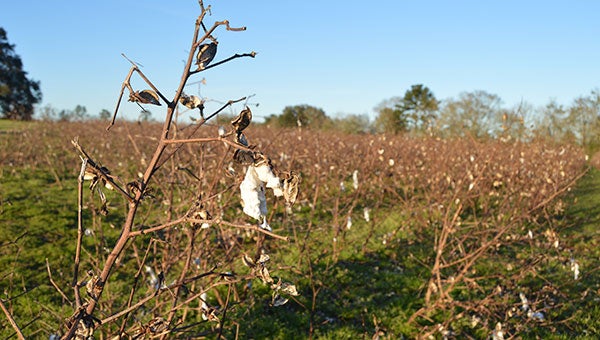Harvest season rains wash out what looked to be a good year for farmers
Published 2:35 am Friday, January 11, 2019

- A few bolls of cotton remain in this field near Andalusia. Wet weather during the harvest season means some farmers still haven’t gotten cotton and peanuts out of the field, and the harvested cotton is so wet, it has slowed the ginning process down across the southeast. Christopher Smith/Star-News
Wet, rainy weather late in the growing season made 2018 one of the worst for local farmers.
“To put it short, the rain has been terrible,” Ricky Wiggins of Wiggins Farms, said. “It’s not so much as to how much rain we have had, but it has been when it has come.”
He said that usually this area gets 50 to 55 inches of rain annually, but last year received 10 inches more than usual.
“We are about five to 10 inches above normal,” Wiggins said. “But we have had several years where we have had more than that and it was O.K. The big thing is that a lot of the rain came during the harvest season, which is extremely abnormal.”
The consequences have been dire, he said.
“This rain has rotted a lot of the cotton and delayed the harvesting of peanuts,” Wiggins said. “You can’t pick either of those crops in the mud or the rain. It is about as bad as I have ever seen it.”
In the beginning of August 2018, local farmers thought they had a great crop, Wiggins said. And then the rains came.
“Everybody thought they had as good a crop, going into the fall, as they could ever have,” Wiggins said. “I mean, peanuts looked good, cotton looked good, everyone had a really good crop set. Then in the middle of August, it started this continuous rain. Not where it would rain everyday, but it would just be constant state of either rain, fog, very little sunshine and a lot of cloud cover.”
Wiggins said that the bolls on the cotton stalk began to rot.
“There is a fungal disease that gets in them and they start to rot,” Wiggins said. “When they start to crack open and they get wet, then they get into a situation called hardlock and the cotton basically won’t fluff out. Overall, we lost almost half of our crop just from that.”
Hardlock is a disease that affects the normal expansion of fibers as the boll opens.
With peanuts, Wiggins said that they are not able to harvest them in the mud.
“Since we weren’t able to dig them out in the mud, it delayed digging,” Wiggins said. “The longer you wait to dig them, the stem starts to deteriorate. If you plow them up when it is wet, they just pull off so you never get the opportunity to run them through a harvester.”
Hurricane Michael added to the terrible weather in October of 2018.
“The hurricane was definitely in the mix,” Wiggins said. “We didn’t get a lot of wind damage, but the rain that came during that time period definitely added to the same old same old. We had cloudy weather and it just delayed everything.
Wiggins said that the weather didn’t affect only the crops in the field, but it affected several gins as well.
“The problem isn’t only on the farm,” Wiggins said. “We finished picking cotton December 7. There is still a lot out there that haven’t been picked, but us personally finished December 7, but we still have modules in the field because of all of this continuous rain, the module trucks have not been able to get to them to pick them up.”
He said that the wetness of the cotton has caused the gins to operate at a slower pace.
“The module trucks will take it to the gin after they have picked it up,” Wiggins said. “But everybody had a tendency to pick cotton a little too wet this time. When the cotton gets wet, then it gets really hard to gin. So where the gin will normally gin around 600 to 700 bales a day, it is struggling to even get 300 bales a day, just because they have to slow down, dry and clean it out. It isn’t just Covington Gin either, it is every single gin I have talked to in the southeast. They are all having this problem.”
Going into 2019, Wiggins and other farmers hope to have a better year than last year.
“We just hope that we have a good season next year,” Wiggins said. “Farmers are of course going to have some bad years, but we also expect to have some good years to make up for it. We have to put a little back when we have the good years so that we will make it through the bad years.”
This year was supposed to be a good year to put back, Wiggins said.
“We thought that this year was going to be a year where we could put a little something back,” Wiggins said. “Pretty much, industry wide, we are coming up short. It is going to take a while to recover. We just came up short this time.”




